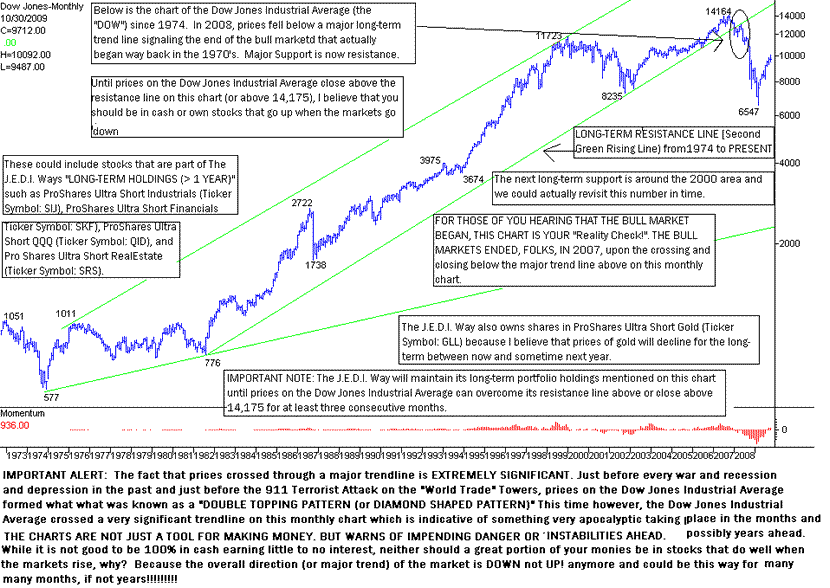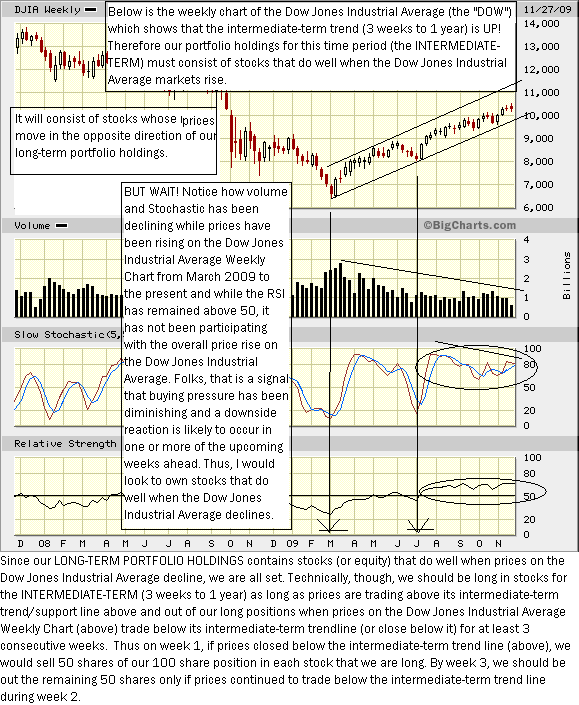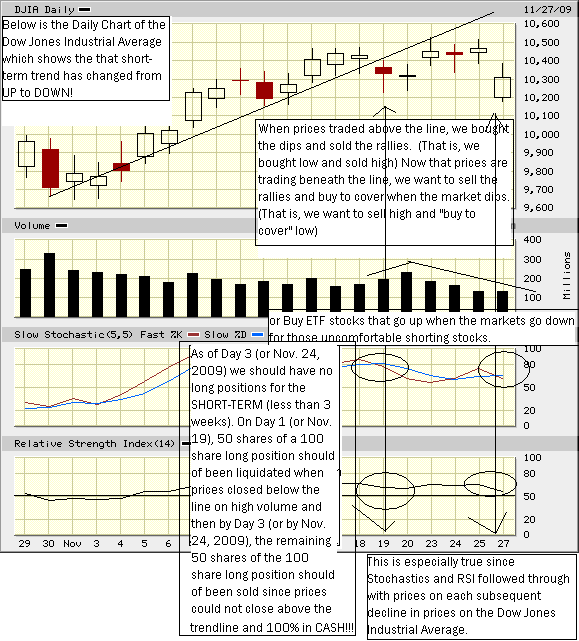Stock Index Trading Trend Analysis
Stock-Markets / Stock Index Trading Nov 29, 2009 - 09:24 PM GMT LONG-TERM TREND (> 1YR) OF THE MARKETS: DOWN -
LONG-TERM TREND (> 1YR) OF THE MARKETS: DOWN -
(See Long-Term Chart of the Dow Jones Industrial Average since 1974 for further details)
THE J.E.D.I. WAY’S LONG-TERM (or POSITIONAL) HOLDINGS [> 1yr]: ______________
ProShares Ultra Short Real Estate (Ticker Symbol: SRS)
ProShares Ultra Short Gold (Ticker Symbol: GLL)
ProShares Ultra Short QQQ (Ticker Symbol: QID)
ProShares Ultra Short Financials (Ticker Symbol: SKF)
ProShares Ultra Short Industrials (Ticker Symbol: SIJ)
Note: The above portfolio was selected based on my analysis of the MONTHLY CHART below of the Dow Jones Industrial Average.
----------------------------------------------------------
INTERMEDIATE TREND OF THE MARKET (Three weeks to 1 Year): UP
(See Weekly Chart of the Dow Jones Industrial Average for further details [below the long-term chart of the Dow Jones Industrial Average])
THE J.E.D.I. WAY’S INTERMEDIATE TERM HOLDINGS (3 weeks to 1 year):
NONE.
Note: This was based on my analysis of the WEEKLY CHART below of the Dow Jones Industrial Average.
-----------------------------------------------------------
SHORT-TERM TREND OF THE MARKET (less than 3 weeks): DOWN
(See Daily Chart below of the Dow Jones Industrial Average for further details [below the Weekly Chart of the Dow Jones Industrial Average])
THE J.E.D.I. WAY’S SHORT-TERM HOLDINGS (less than 3 weeks):
NONE.
Note: This was based on my analysis of the DAILY CHART below of the Dow Jones Industrial Average.
LONG-TERM CHART OF THE DOW JONES INDUSTRIAL AVERAGE

NOTE: When the major trend was up (that is when prices were trading above the long-term trend-line above), we bought the dips above it and sold the rallies from 1974 to 2007. (vis-a-vis "bought low and sold high")
Since the major trend has changed from up to down, all rallies beneath the major trend line should technically be sold! And then bought back when the market dips. (vis-a-vis "sell low and buy to cover even lower") otherwise invest in ETF stocks whose prices go up when the markets go down like or similar to the ones in THE J.E.D.I. Way’s LONG-TERM PORTFOLIO. This strategy should be used in my opinino until the resitance line on the monthly chart becomes support (or until prices on the Dow Jones Industrial Average closes above 14,175 and stays at or above this price level for at least three consecutive months!!!)
INTERMEDIATE-TERM CHART OF THE DOW JONES INDUSTRIAL AVERAGE

But we are abstaining from holding long positions in the intermediate-term because since it implies that prices on the Dow Jones Industrial Average are overbought in the intermeidate term and that we should not hold any long positions.
SHORT-TERM CHART OF THE DOW JONES INDUSTRIAL AVERAGE

On Day 4 (or Nov.24th), after liquidated all long positions and in 100% in CASH, while the market were still open for trading, the next step would of been to use a portion of our CASH proceeds (I like to use at leat 66.50% of cash) to purchase stocks that do well when the markets go down like the equity in The J.E.D.I. Way’s LONG-TERM STOCK PORTFOLIO.
SUMMARY:
As long as prices trade below both the Long-Term and Short-Term Trendlines and the negative divergence exist in the Intermediate-Term, The J.E.D.I. Way will maintain its current equity positions listed above.
Best Regards,
Patrice V. Johnson
E-mail : Patrice@stockbarometer.com if you have any questions about this trade or any other questions or comments.
If you are interested in continuing to receive our advice as your free trial, please click the following link to subscribe.
http://www.stockbarometer.com/pagesJEDI/learnmore.aspx
Important Disclosure
Futures, Options, Mutual Fund, ETF and Equity trading have large potential rewards, but also large potential risk. You must be aware of the risks and be willing to accept them in order to invest in these markets. Don't trade with money you can't afford to lose. This is neither a solicitation nor an offer to buy/sell Futures, Options, Mutual Funds or Equities. No representation is being made that any account will or is likely to achieve profits or losses similar to those discussed on this Web site. The past performance of any trading system or methodology is not necessarily indicative of future results.
Performance results are hypothetical. Hypothetical or simulated performance results have certain inherent limitations. Unlike an actual performance record, simulated results do not represent actual trading. Also, since the trades have not actually been executed, the results may have under- or over-compensated for the impact, if any, of certain market factors, such as a lack of liquidity. Simulated trading programs in general are also subject to the fact that they are designed with the benefit of hindsight. No representation is being made that any account will or is likely to achieve profits or losses similar to those shown.
Investment Research Group and all individuals affiliated with Investment Research Group assume no responsibilities for your trading and investment results.
Investment Research Group (IRG), as a publisher of a financial newsletter of general and regular circulation, cannot tender individual investment advice. Only a registered broker or investment adviser may advise you individually on the suitability and performance of your portfolio or specific investments.
In making any investment decision, you will rely solely on your own review and examination of the fact and records relating to such investments. Past performance of our recommendations is not an indication of future performance. The publisher shall have no liability of whatever nature in respect of any claims, damages, loss, or expense arising out of or in connection with the reliance by you on the contents of our Web site, any promotion, published material, alert, or update.
For a complete understanding of the risks associated with trading, see our Risk Disclosure.
© 2009 Copyright Patrice V. Johnson - All Rights Reserved
Disclaimer: The above is a matter of opinion provided for general information purposes only and is not intended as investment advice. Information and analysis above are derived from sources and utilising methods believed to be reliable, but we cannot accept responsibility for any losses you may incur as a result of this analysis. Individuals should consult with their personal financial advisors.
© 2005-2022 http://www.MarketOracle.co.uk - The Market Oracle is a FREE Daily Financial Markets Analysis & Forecasting online publication.



